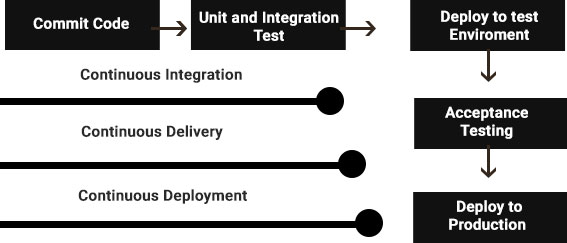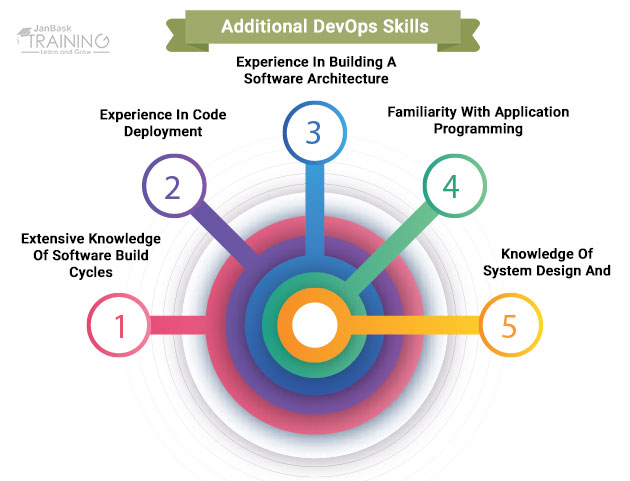02
JanChristmas Offer : Get Flat 50% OFF on Live Classes + $999 Worth of Study Material FREE! - SCHEDULE CALL
DevOps is a buzzword in the industry today. Every organization uses best DevOps practices but what DevOps skills are organizations looking for? This blog will explain the list of best DevOps skills that are necessary to become a successful DevOps engineer. These skills are listed after in- depth research to help you getting success and getting hired in a few attempts only.
Enterprises like Adobe, Amazon are increasingly turning to DevOps to deliver software product and security updates more rapidly. And the spread of workflows signifies there is more requirement of DevOps engineers than ever. DevOps jobs were ranked at number 3 in the list of Indeed jobs in the year 2017 for salary, a number of jobs posting, and opportunities for growth. The positions grew by 106 percent during the last few years with a boost in the average salary of $123,165. 
To start an exemplary career in DevOps, engineers should be able to adapt by new technologies frequently. It means a person at the DevOps position should be curious, intelligent, and motivated. Here is a list of top DevOps skills needed by every engineer to succeed at the job.
DevOps involves multiple stages and there is a wide range of tools available for every stage. Here, it is necessary to have depth knowledge of development, testing, and deployment technologies.
A great DevOps engineer is always curious to learn new things. He or she must constantly ask questions and listen to answers to generate ideas. He should know how to welcome new challenges gracefully.
DevOps is all about transforming work experience between development and operation teams by breaking down the silos. A great DevOps engineer acts as a bridge between silos and brings different teams together to work towards a common objective. DevOps engineers tend to look more at tools instead of people and processes. For a beginner, they should know about people, the work culture, and how the organizations run. They build a strategy first to simplify the overall working environment and try to achieve the goal of continuous delivery.
Read: What is The Difference Between Devops, Sysops & Webops
Also, they should have strong communication skills, not only to interact within an organization but to implement or standardize DevOps well.
To automate the infrastructure automation as a DevOps engineer, you should be familiar with at least one scripting language. Most of the Companies are working on Linux and they need experts with hands-on expertize on various tools like Puppet, Chef, Ansible etc. To become a great DevOps engineer, you should knowledge of basic Linux concepts too and the scripting language could be Python, Ruby, PERL etc.
 Knowledge of different DevOps tools is not enough, you should know where to use these tools to facilitate continuous integration and continuous delivery. In a few cases, continuous deployment is also given priority but continuous deployment is not a good practice at all.
Knowledge of different DevOps tools is not enough, you should know where to use these tools to facilitate continuous integration and continuous delivery. In a few cases, continuous deployment is also given priority but continuous deployment is not a good practice at all.
While combining development and operations together to streamline deployment, there are chances that vulnerabilities can be introduced much faster than earlier. It would be great if DevOps engineer can write the source code to protect apps against vulnerabilities. For this purpose, build a secure software program from scratch. Perform the necessary security activities during the requirement phase of the DevOps journey. Although DevOps engineers don’t need to be security experts but they will get huge benefits from software security training with basic understanding of security concepts.
IAC or infrastructure as a code is a type of IT infrastructure that can be managed by operations team automatically through code provisioning rather than using a manual process. IAC sometimes referred to as the programmable infrastructure too. With the advent of IAC, the line between developers and operations team is getting blurred and various tools are available to make the things easy like Puppet, Chef, or Ansible etc.
DevOps is not a technology but is a methodology. DevOps aims at bringing Dev and Ops team together to release high-quality software on time. If you understand the basic concepts of DevOps then you may deliver better solutions to complex business problems. Further, DevOps engineer not only helps to release quality software on time but helps to market that software application at the lowest possible costs.
Read: Top 50+ Jenkins Interview Questions And Answers For 2025
He is also responsible for cultivating positive relationships with business and customers. The person interested in the field needs to listen carefully, negotiate tough business problems, and build teams.
Automation is driven by the testing, so strong testing skills are needed to become a successful DevOps engineer. With a proper testing plan, you can be sure that each function is behaving in the same way for which it was written. For all stages from development to deployment, we may run tests to make sure the entire system is intact with new features.
While DevOps are not external facing roles, developers, QA, project managers, end-users, business leaders, all are their clients. When juggling with other team members within an organization or outside to an organization, the transparent communications is the key for building successful relationships.
A great DevOps engineer always cares about delivering maximum value to customers and has the ability to understand their needs to the maximum extent. They are also focused on the final output and how to optimize it for the end to end success.
A DevOps engineer should be aware of network basics. The main objective of a DevOps project is to deliver an application successfully to the end-user who will consume it. You don’t have to be a network expert but the basic knowledge of networks helps to design and deliver an application successfully without any connectivity issues.
The best idea is to complete any relevant certification course in networking to gain relevant knowledge necessary for DevOps engineers. For this purpose, research online and find which course can be more suitable for your profile.
The DevOps culture demands for the flexibility and all of this is a risk/reward exercise. This is an opportunity for security leaders to grow and chance for DevOps professionals to lead. Another important key skill for a DevOps engineer is multitasking. He works on multiple mission-critical systems at the hear of processes for different teams.
Read: What is Ansible? Ansible Tutorial Guide for Beginners
He gets multiple requests together from different team members at once. Sometimes, all requests are urgent and need to resolve early. Here, it is necessary for DevOps engineers to learn how to work on multiple tasks together when each of them is critical.
Usually, software engineers are transitioned to the role of a DevOps engineer, Sometimes, he lacks the ability to look at the big picture and not able to identify what makes sense for the client. While working with large enterprises, a DevOps engineer cannot lose sight of the big picture and digital transformation at the enterprise level. It helps to avoid the creation of contention points or constraints that carry from one project to the next. 
A set of other important skills looked by hiring managers in the DevOps space include:
A set of useful certifications or training in the DevOps space include
The good news that the industry needs from DevOps professionals are in sync with what DevOps engineers want from their workplace. According to a research report from Puppet Labs, an atmosphere conducive to learning is taken as the primary component of job satisfaction among DevOps engineers. The person having all necessary DevOps skills as listed in the blog is able to automate workflows and getting products more marketable effectively and efficiently.
As we know that more than 25 present of total global organizations have already adopted DevOps as the mainstream strategy, so DevOps skills are high in demand in 2019 and the best career option for job seekers too. It would be great joining DevOps certification training program online to gain all the competitive skills needed to succeed in the DevOps space.
Read: How To Learn DevOps Online? Complete DevOps Tutorial!
 Pinterest
Pinterest
 Email
Email
The JanBask Training Team includes certified professionals and expert writers dedicated to helping learners navigate their career journeys in QA, Cybersecurity, Salesforce, and more. Each article is carefully researched and reviewed to ensure quality and relevance.

Cyber Security

QA

Salesforce

Business Analyst

MS SQL Server

Data Science

DevOps

Hadoop

Python

Artificial Intelligence

Machine Learning

Tableau
Search Posts
Related Posts
Receive Latest Materials and Offers on DevOps Course
Interviews